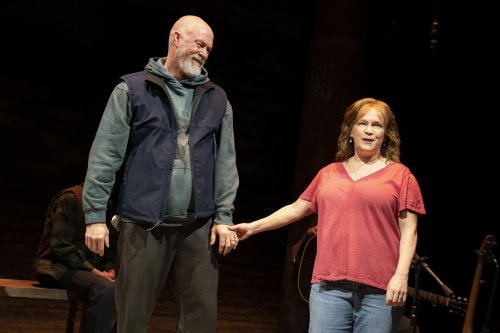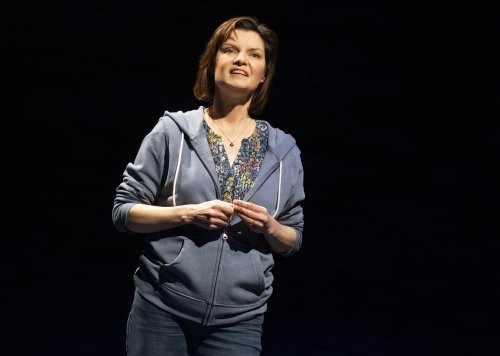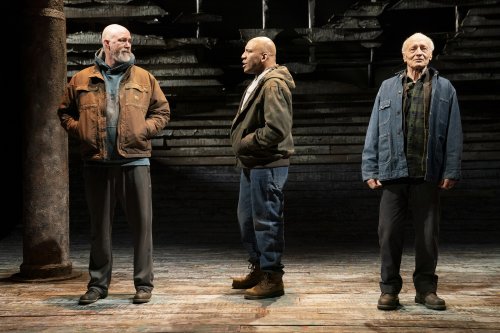Coal Country
Documentary style play from the team that wrote “The Exonerated” investigating a West Virginia mine disaster, with folk music from singer/songwriter Steve Earle.

Steve Earle (foreground) in a scene from “Coal Country” at The Public Theater (Photo credit: Joan Marcus)
[avatar user=”Victor Gluck” size=”96″ align=”left”] Victor Gluck, Editor-in-Chief[/avatar]
For Coal Country, an investigation into the April 5, 2010 West Virginia disaster at Massey Energy’s Upper Big Branch coal mine which killed 29 men, authors Jessica Blank and Erik Jensen based their documentary play on first person interviews with the families of many of the victims, sons, brothers, fathers, husbands, nephews. Powerful in the piling up of evidence of malfeasance just as they had done in The Exonerated, the play undercuts its dramatic power by revealing the end of the story at the very beginning so that the ultimate court decision comes as no surprise. Nevertheless, the individual stories told by seven actors speaking the real words of family members are very compelling.
The mine disaster was no surprise to the men who worked there. They knew something was wrong with the ventilation system as some days they were burning up and other days they were freezing. Some men came home so tired from lack of oxygen that they could not stay awake at dinner time. An earlier roof cave-in caused methane gas to build up and some of the miners guessed that safety precautions were being ignored. As Stanley Stewart, aka Goose, told his wife seven or eight months before the disaster, it was “a ticking time bomb.” However, as Massey Energy was the only game in town there were no other jobs to get. It was either work for them or leave town, but none of these families knew any other way of life.

The company of “Coal Country” at The Public Theater (Photo credit: Joan Marcus)
Along with original folk music by singer/songwriter Steve Earle, the play consists of the stories and testimony of seven family members, men and women, one of whom survived the disaster, as well as the ruling of Melinda Tanner as Judge Berger in the subsequent trial of Massey Energy CEO Dan Blankenship. It eventually comes to light that the longwall behind which the explosion took place was producing $600,000 a day of high quality coal and that Blankenship’s compensation package was tied to production. Any shut down for safety considerations and his and the company’s profits were eaten into.
It hadn’t always been like that: before Massey Energy bought out the UBB (as the Upper Big Branch was called) from Peabody Coal it had been a union operation which strictly followed the rules. However, after it was purchased it was allowed to be non-union, but only if they hired so many of the union people. If you complained about conditions, “they started writing you up, and they say, you’re not a good worker, you’re fired. And safety started going out the window. In order to keep their jobs, the miners kept their concerns to themselves.

Michael Gaston and Amelia Campbell in a scene from “Coal Country” at The Public Theater (Photo credit: Joan Marcus)
The cast is most accomplished as the seven disparate family members who tell their personal stories from various points of view. Thomas Kopache plays Gary Quarles, 60’s, a quiet soft spoken man whose father and grandfather ahead of him went down in the mines, and he ends up with 34 years of coal mining. And then his son Gary Wayne went down in the mines and never came back. Michael Laurence’s Tommy Davis, 50’s, is an angry, grizzled man who was one of five members in his family the day of the disaster who were down in the UBB: his brother Timmy, his son Cory, Timmy’s son Cody and his nephew Joshua. Only Tommy made it out alive and he has refused to let the evidence rest.
Goose and Mindi (Michael Gaston and Amelia Campbell) are a feisty married couple in their 50’s who met late in life. Goose has lost his father in the mines and began mining himself at age 19. When Goose came from the mines knowing that he had been smelling methane gas build up, Mindi who worked at a beauty school could not understand why he didn’t quit as they would survive. Patti (Mary Bacon), late 40’s, is a single parent and a nurse, who becomes involved with Greg, a miner and her next door neighbor who had only made small talk before they got to know each other. Together four and a half years, Patti and Greg were engaged to be married on the day he did not come home from the mine disaster. The fate of his son Little Greg of whom he had custody was up in the air as Patti had no legal guardianship of him although she had been mother to him for the past half a dozen years.

Mary Bacon in a scene from “Coal Country” at The Public Theater (Photo credit: Joan Marcus)
Ezra Knight’s soft-spoken Roosevelt Lynch Jr., the only African American witness to testify in the play, had followed his father Roosevelt Lynch Sr. into the mines. They know each other’s schedule so well that on the day of the disaster when Roosevelt did not pass his father’s car going the other way he knew something terrible had happened. Finally, there is Dr. Judy Petersen (Deirdre Madigan) who was waiting for news of her brother Dean, one of a pair of identical twins, when she is told she is not one of them, and for the first time felt like an outsider in the community she had been born in.
Accompanying himself on the guitar, folksinger Earle sings six original songs with names like “Heaven Ain’t Goin Nowhere,” “The Mountain,” “Union God and Country,” “The Devil Put Coal in the Ground,” “Time is Never on Your Side” and “It’s About Blood,” as well as the traditional folk song about John Henry of West Virginia legend, usually alone but sometimes in concert with the other actors, and once requiring audience participation. His final song, “If I Could See Your Face Again” is sung plaintively by as a solo by Bacon’s Patti to her lost Greg. The songs punctuate the testimony and give us some mental relief from the piling up of evidence which becomes an overwhelming testimony to greed and skirting the rules.

Michael Gaston, Ezra Knight and Thomas Kopache in a scene from “Coal Country” at The Public Theater (Photo credit: Joan Marcus)
Co-author Blank’s direction is curiously unemotional, allowing the anecdotes to speak for themselves but less dramatic than they might be. While the testimony builds up a community of similarly led lives, as the characters never address or talk to each other they all seem to be entirely independent of the others. Nevertheless, the spoken words which come from the actual people speak for themselves and build up a tragedy that is still felt to this day. Richard Hoover’s all-wood set lends itself to the atmosphere and tone of the play, while costume designer Jessica Jahn’s work clothes have a lived-in look to them making them very authentic. David Lander’s unobtrusive lighting captures the location and the feeling of the play.
Coal Country (through March 11, 2020)
The Public Theater
Anspacher Theater, 425 Lafayette Street, in Manhattan
For tickets call 212-967-7555 or visit http://www.publictheater.org
Running time: one hour and 30 minutes without an intermission






Leave a comment